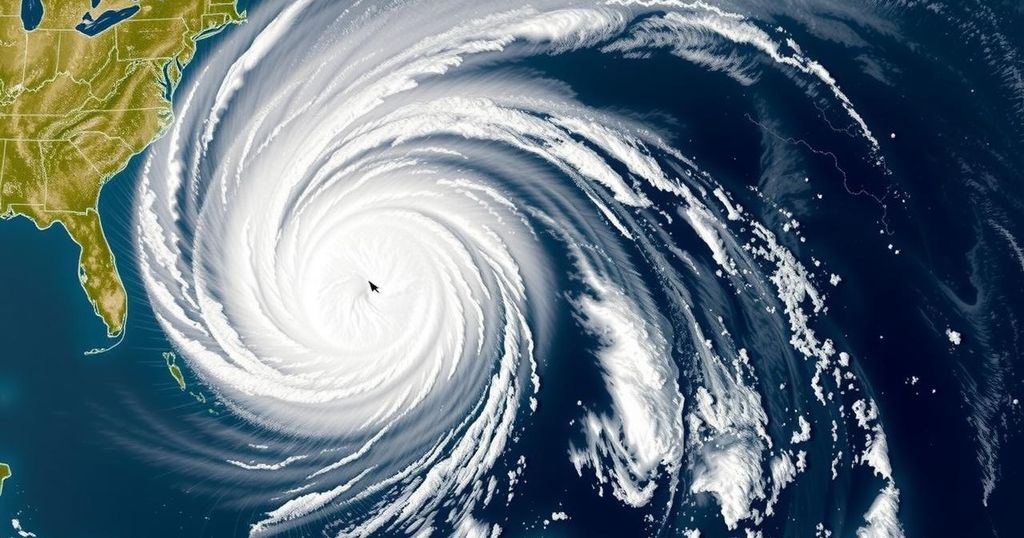Cyclone Chido Causes Devastation in Mayotte, Threatens Eastern Africa
Tropical Cyclone Chido devastated Mayotte with winds over 220 km/h, causing extensive damage and prompting urgent rescue operations. Authorities expressed concern for the region’s inhabitants and neighboring Comoros, as Chido heads towards Mozambique, potentially affecting millions. The cyclone season, exacerbated by climate change, poses increasing risks for southern Africa, necessitating heightened preparedness.
The French territory of Mayotte has experienced significant devastation due to Tropical Cyclone Chido, which is currently moving toward the eastern coast of Africa. The cyclone produced winds exceeding 220 kilometers per hour, leading to extensive destruction, including roofs torn from buildings in a region inhabited by over 300,000 residents across two main islands. Fortunately, there are no immediate reports of fatalities.
Mayotte Prefect Francois-Xavier Bieuville described Chido as the most violent cyclone the island has encountered since 1934, indicating severe losses among the local population. Following the cyclone, the highest alert has been lifted, enabling rescue operations to commence. Despite the lifting of this alert for emergency services, residents are urged to remain in secure shelters.
French Interior Minister Bruno Retailleau affirmed the severity of the situation, noting the extensive damages. Thousands of homes have reportedly lost power, with numerous smaller structures destroyed and trees uprooted. To assist with recovery efforts, 110 rescuers and firefighters from France and Reunion Island have been dispatched, with a subsequent reinforcement of 140 personnel scheduled for the following day.
The neighboring nation of Comoros is also suffering from the effects of Cyclone Chido, prompting authorities to issue a red alert. Officials expressed concern for a group of 11 fishermen unaccounted for since embarking on a sea venture prior to the storm. In response to the threat, all vessels have been instructed to remain anchored, and the main airport along with government offices have been temporarily closed.
Forecasters predict that Cyclone Chido will continue its path eastward, likely making landfall in Mozambique late Saturday or early Sunday. The national disaster agency has warned that approximately 2.5 million individuals in the northern provinces may be impacted. Further inland, nations such as Malawi and Zimbabwe are bracing for the storm’s aftermath, with concerns about flooding leading to preemptive evacuations and warnings for residents to seek higher ground.
The cyclone season in this region runs from December to March, with southern Africa having faced a series of increasingly powerful storms in recent years. Past cyclones like Idai in 2019 and Freddy last year have resulted in substantial loss of life and widespread humanitarian crises. Experts attribute the increasing severity of these cyclones to climate change, which poses significant challenges for poorer nations that contribute minimally to global climate change yet must manage its devastating impacts.
Tropical cyclones are a recurrent phenomenon in the southeastern Indian Ocean, particularly during the cyclone season that spans December through March. Cyclone Chido has emerged as one of the most potent storms to strike Mayotte and surrounding regions in decades, causing widespread destruction. The aftermath of such storms often leads to humanitarian crises, particularly in developing nations, where infrastructure is less resilient. Climate change is recognized as a significant factor contributing to the intensified frequency and severity of cyclones, impacting vulnerable communities that are ill-equipped to cope with these disasters. Historical cyclones in the region, such as Idai and Freddy, underscore the catastrophic potential of these storms, highlighting the urgent need for improved disaster preparedness and response strategies in affected regions.
In summary, Tropical Cyclone Chido has caused extensive damage in Mayotte and poses imminent threats to neighboring regions as it progresses toward mainland Africa. While there are currently no reported casualties, the scale of destruction is substantial, prompting urgent rescue efforts. Preparedness measures are being enacted across affected nations as they brace for flooding and additional impacts. As climate change exacerbates the frequency and severity of cyclones, the need for robust disaster response frameworks in vulnerable regions remains critical.
Original Source: www.voanews.com




Post Comment